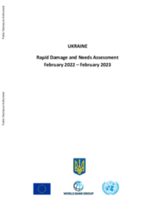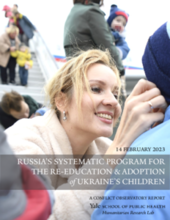Displaying 71 - 80 of 516
Con este documento se pretende ofrecer un marco sobre cómo implementar las normas internacionales al trabajar con niños/as y sus
familias que se han visto afectados por esta crisis.
Ce document fournit des conseils sur la manière d’appliquer les normes internationales en travaillant avec les enfants et leurs familles touchés par cette crise.
This International Social Service document provides guidance on how to apply international standards when working with children and their families impacted by the crisis in Ukraine.
The report focuses on the 5 key strategic priorities: critical and social infrastructure, energy infrastructure, housing, private sectors development and humanitarian demining.
This Communication takes stock of the Temporary Protection Directive implemented on 4 March 2022 over the course of one year. It provides insight into how the EU managed to enable and coordinate a response to the largest displacement on European soil since the Second World War.
Принудительное перемещение, депортация и усыновление детей из Украины, призводящее к окончательному разлучению детей с их семьями, сообществами и культурой, является явным нарушением их прав человека и международного гуманитарного права и пр
Alexander is one of many Ukrainian teenagers who fled to Moldova unaccompanied. Thanks to the partnership between border police, child protection specialists working with UNICEF and local authorities, he was identified and integrated into a foster family from Causeni. Since the onset of the conflict, one of UNICEF's biggest priorities has been to protect children from abuse or trafficking.
At its resumed eleventh emergency special session, the world body adopted a new resolution calling for an end to the war, only hours before the conflict enters its second year on Friday, 24 February 2023.
This report published by the Yale School of Public Health’s Humanitarian Research Lab (HRL) documents the relocation by Russia of at least 6,000 children from Ukraine to a network of re-education and adoption facilities in Russia-occupied Crimea and mainland Russia.
This report examines what happens after unaccompanied children have arrived at their European destinations and is based on interviews with key informants, a literature review, and research in three sites (Lebanon, Greece and Germany). What does it mean to integrate into a new society when you are a child on your own? How do they face the challenges of building an identity without their families, process the violence and dangers of their journeys, and face a new situation that may not be as welcoming or straightforward as they had expected?









